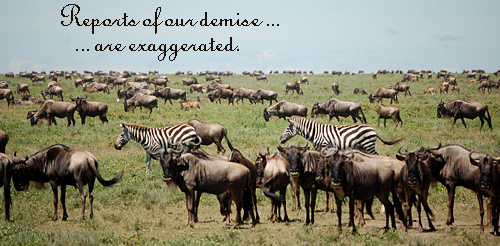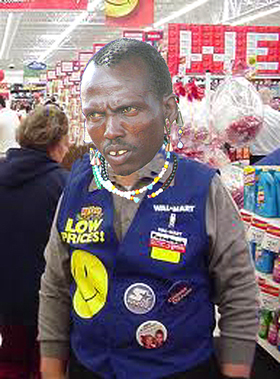
But I took this, this year, with my Cannon SureShot.
Many of you truly concerned wildlife enthusiasts have sent me the link to the bad BBC story claiming that Kenya’s best game reserve is in a tailspin. Thank you, but take a powder and lie-down.
The purported “study” by Joseph Ogutu at the University of Hohenheim is the second study by Ogutu on the Mara. His first purported up to 95% of certain animals had disappeared and was uniformly dismissed by scientists worldwide.
I found it interesting this morning that the branch of the university that Ogutu is supposedly registered with, has an “internet problem.” Linking to the Bioinfomatics Unit of the University of Hohenheim cited in the BBC report generates this message [poorly translated from the German]: “Because of maintenance work the Intranet and some other homepages are not available.”
Hmm.
Mara wildlife has declined, and local wildlife censuses have confirmed this, but nowhere near as catastrophic as suggested in Ogutu’s report. Ogutu told the BBC that Mara wildlife had declined by “two-thirds.”
Nonsense.
Here’s the truth. No one knows in any good scientific way. The Kenya Wildlife Service conducts wildlife censuses that are excellent, but KWS has limited jurisdiction in the Mara which is technically controlled by local county counsels. In fact as I’ve decried loudly before, the Mara’s catastrophic problem is management not an apocalyptic reduction in game.
At one point three separate entities were controlling what we call “the Mara” and they didn’t like one another. So it’s literally impossible to conduct uniform studies over the area. And to make matters worse, historically the data is equally terrible.
Ogutu did the worst possible research as a result. He picked and chose segmented area studies over 15 years, none of which were comprehensive of the area as a whole. Moreover, I’m certain in the weeks ahead real scientists will challenge much of his root data.
Ogutu had decided the Mara was in a tailspin even before he did this study. Last year when the area was just recovering from a three-year drought, he claimed half the animals in the Mara were gone by incorrectly citing a continent-wide study
from the United Nations Environment Programme and London Zoological Society which addressed the whole continent, not just the Mara.
There are good studies, particularly from the Frankfurt Zoological Society, on the biomass of the Serengeti and larger Serengeti/Mara ecosystems. There are also good studies on individual species, like lion and elephant and so forth. And unfortunately, we can only surmise by broad intersections of these individual studies what the situation is, in the Mara.
It’s OK.
It’s very threatened, perhaps more so than at any time before. This is mostly because of (1) weather, also closely because of (2) Kenya’s rapidly developing economy leading to human/wild animal conflicts, and interminably (3) the untenable way the poor reserve is managed.
But don’t write it off, yet. Kenyans are remarkably creative these days.
Ogutu is correct that there has been a significant decline in Mara herbivores, particularly with regards to the wildebeest migration. But this is not directly due to cattle grazing encroachment as he claims. It is because of weather. Two dynamics are at play.
First, the Serengeti just below the Mara has been much wetter than normal (as has the Mara) but while areas just immediately to the north and east have been much drier. Global warming at its best on the equator creates these weird and frighteningly small and distinct weather regions.
So while there were floods in the Mara, in adjacent cattle grazing Koiyaki and Lemuk private reserves, it was bone dry. In times of drought cattle tended by cattle owners over compete with wild game.
Second, because the Serengeti has been wetter than normal, the wildebeest have not needed to move into the Mara (the furthest northern part of their migration) with the same regularity as in the past. Historically the Mara was the wettest part of the Serengeti/Mara ecosystem. That definitely is changing. There will be less and less of the migration traveling into the Mara, now, with global warming.
The wildebeest population has remained constant at around 1.5 million animals for more than ten years. Ditto for the third of a million zebra.
So without intending to minimize the real threats existing in the Mara, let’s not exaggerate them, either. I wish Vanity Fair or the New York Review of Books would do a story. There is no new crisis in the Mara. Visitors today will notice little difference from ten years ago, except maybe with regards to the migration.
Rather there is a continuing decade’s long crisis we definitely need to do something about, which cannot exclude global warming. And there is an ever deepening crisis in the way we learn things.
